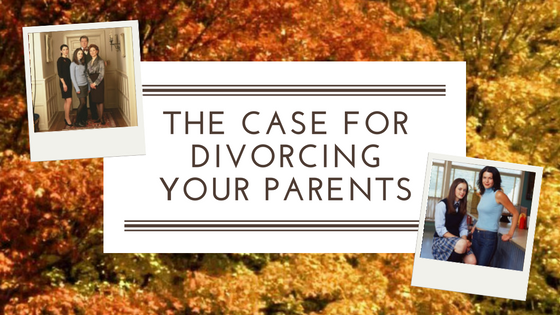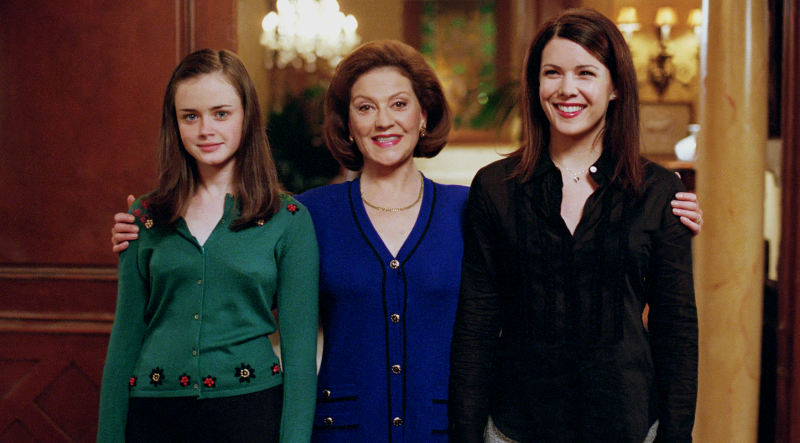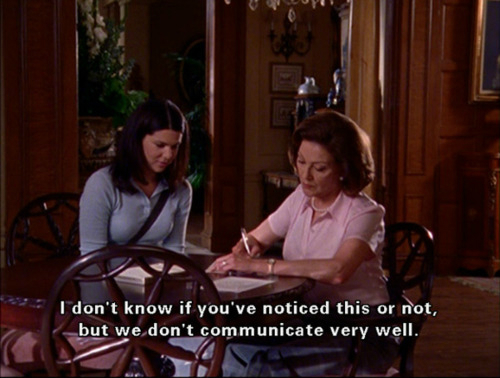
Eliminating toxic people from your life is widely considered a healthy action. Not doing so, giving into “energy vampires” or allowing the manipulation of others to dictate your life choices, ultimately leaves you drained, unhappy, and lacking confidence. My therapist tells me that all the time. She applauds me when I cut off contact with people who are dragging me down. But what do you do when the toxic people in your life are the ones who gave birth to you?
The answer should be obvious: you eliminate them from your life. Right? That’s what you do with toxic people, regardless of whether you share DNA. “BUT FAMILY!” someone cries in the comments. Listen: family is not always the one into which you’re born, and oftentimes it’s necessary to cut ties with blood relatives in order to pursue a better life for yourself. However, as I can tell you from personal experience, the obviousness of this solution doesn’t always take precedence over the guilt of not wanting to be around your family. It’s hard to turn your back on people you’ve been conditioned to love in spite of all of their flaws, no matter how glaring or harmful.
Gilmore Girls handles this messy subject with a surprising amount of humor and grace.
The main relationship on Gilmore Girls is the one between Lorelai and Rory: this mother/daughter duo is simultaneously #friendshipgoals and the kind of parent/child relationship that lots of people crave. Lorelai is a cool, single mom working her butt off to provide everything Rory needs without the help of anyone. Rory is a bookish, witty daughter eager to succeed in academia. Together, they are a force to be reckoned with, fast-talking and fierce. As much as we all want to debate who Rory should end up with in the upcoming Netflix series, or argue about whether Luke or Christopher is the right choice for Lorelai, the heart of this show is two of our favorite Gilmore women.
Running parallel to that relationship is the one between Emily and Lorelai, which is vastly different. Where Lorelai and Rory are most often friends before parent and child, Emily and Lorelai are always parent and child, fullstop. Even as the series progresses and the relationship between them changes and grows, at the end of the day, they are a mother/daughter pair whose relationship is fraught with tension. Love, anger, disappointment, pride, and guilt all frame every interaction, making it difficult for them to move away from the past and toward the future.
It’s difficult to fully dissect the relationship between Emily and Lorelai (and Emily and Rory, by extension, as well as Emily and Lorelai and Rory), but it would seem there are a handful of key factors that should be explored.
Independence

Emily and Lorelai are presented as fundamentally different people. Emily is highly involved with the Daughters of the Revolution, treats her maids poorly, and dedicates her life to being the best corporate wife she can possibly be. Lorelai, on the other hand, involves herself in the bizarre life and politics of Stars Hollow, refuses to marry Rory’s father (until much, much later in the series, though that’s another discussion for another blog post), and works her way up from being a maid (a position Emily clearly looks down upon) to eventually owning her own inn.
As much as Lorelai tries to establish herself as completely different from Emily, however, she isn’t always successful. It’s obvious that her penchant for snappy comments comes directly from her mother, though they wield this weapon differently. Lorelai’s quick wit falters in the face of Emily’s sharp tongue, shrinking Lorelai by years in every interaction. In the face of her parents, she ceases to be the cool, collected, witty woman who can shame a passing stranger for hitting on an underage girl with a single sentence and instead reverts back to being a sullen teenager, snappish and defensive about everything. She says to Rory in the pilot episode that she feels “shorter” after the first Friday night dinner, suggesting that her physical person has been cowed by her parents’ treatment. This idea is revisited when she later tells Luke she attended a “flagellation” instead of dinner with her parents.
Lorelai’s comparisons to physical abuse aren’t without warrant. She feels attacked and threatened by the comments her parents make, to the point that she feels smaller and significantly less confident because of them. For example, Richard makes a point to tell Rory that she takes after her father, blatantly disregarding Lorelai’s success in raising her. Christopher is hardly ever around — in the pilot, he is in California launching an internet start-up — while Lorelai dedicates her every waking moment to being a good mom. Richard brings up Christopher’s business success in a way that belittles Lorelai’s efforts at the inn, and Emily tells Lorelai that she’s overreacting to her father’s comments.
This is called gaslighting, and it’s a form of psychological abuse: Emily undercuts Lorelai’s reactions by making them seem out of proportion and insane. This abuse tactic is incredibly common and often goes unnoticed. Since the victim is manipulated into believing that their thoughts and feelings are invalid, the victim is often unable to recognize that they are being abused at all, let alone tell anyone about what is happening. If they do tell someone, they expect to be invalidated, because they’ve been conditioned to think that they are always “overreacting.”
Assuming that Lorelai’s parents have always been casual about disregarding her feelings, it’s easy to see why Lorelai made the decision to leave home after she gave birth. She was sixteen, being told she had to marry her high school sweetheart after she’d gotten pregnant because it was “the right thing to do,” and facing a future of society life that she didn’t want. She repeatedly states that she didn’t want to live under the societal thumb of her parents, but it’s clear from the pilot that much of Richard and Emily’s behavior makes Lorelai feel undervalued, which is a valid reason to want to pursue total independence from her parents.
Obligation and Finances

After she leaves home, Lorelai’s contact with her parents — and therefore Rory’s contact with them — is limited to major holidays. The series points this out on several occasions, beginning right in the pilot. This point is driven home again in season two, when Emily swallows her pride and asks Mia — the woman who took Lorelai and Rory in and gave Lorelai her job as a maid — about that time when Lorelai first showed up in Stars Hollow. Emily and Richard haven’t been privy to much of Rory’s life, a decision made by Lorelai when Rory was still too young to have an opinion.
However, the fact that Lorelai and Rory see Emily and Richard even on just major holidays suggests that even when Lorelai wants to be completely independent, she still feels a sense of familial obligation. Seeing her parents on holidays is a decent compromise in that sense: the major “family holidays” all cluster at the end of the year, making it easy for Lorelai to ignore her parents for the rest of the calendar months.
Furthermore, she refuses further involvement from her parents insofar as she won’t even ask them for favors. When it rapidly becomes apparent that Lorelai must ask her parents for money to put Rory through Chilton, she still hesitates to take that leap and put herself in their clutches. When she does, Lorelai makes it very clear that she will pay back every cent and that she hates to be asking. Richard, though, doesn’t seem surprised by her need, which suggests that a) she’s been forced to ask for financial help before (but likely paid it back) or b) he assumes that the only thing that would bring Lorelai home on any day that isn’t a holiday must be finances. This suggests that, at least to Richard, “familial obligation” takes second place to “financial need.”
Honestly, he’s not wrong. Finances complicate family ties in a big way. As someone who hates asking for money because I’ve spent most of my life being told that there isn’t and will never be enough to go around, it’s especially uncomfortable to request money from family members. That discomfort is only heightened by my general fear of causing disappointment or “being a burden”, something I think Lorelai feels in at least a vague sense.
Going to Emily and Richard seems to strike real fear into Lorelai. She talks around the issue, repeatedly asks Richard to sit down even when he repeatedly says “you need money”, something that seems to just agitate her further until she finally spits it out. Sharing the amazing news that Rory has been accepted into Chilton is tainted by the fact that Lorelai cannot afford the tuition on her own, and that she has to rely on her parents — whom she’s actively avoided other than on holidays for sixteen years — which will surely put her into their debt. Literally.
What’s interesting about this interaction is that Lorelai seems fairly in control until Richard says he’ll get the checkbook. Her relief that he, apparently, has given up on the possibility of being any more involved in Lorelai and Rory’s is palpable. Her entire face relaxes, her shoulders dropping, her thanks exhaled on a breath. Then, Emily speaks up and Lorelai goes completely rigid. She was waiting for the other shoe to drop, and here it is.
“Now that we are financially involved in your life, I want to be actively involved in your life,” Emily says.
To someone who’s worked so hard to be independent in every way from her controlling parents, this likely sounds like a death sentence to Lorelai. She initially reacts with horror to the idea of Friday night dinners and once-weekly phone calls, but eventually agrees because she’s trying to do what’s best for Rory.
Sacrificing her own comfort to help Rory achieve her educational dreams is brave. It also forces Lorelai to reconcile the woman she is with the child she was; in the face of this new relationship with her parents, which becomes increasingly entangled as the series progresses, she has to find ways to maintain her sense of self while also finding ways to compromise with her parents. Likewise, Emily has to learn how to interact with her daughter as an independent adult capable of making her own decisions. This growth is slow, and sometimes hard to watch, but it also reveals quite a bit about these women and how they handle stress.
Parenting

Throughout the series, Friday night dinners are a huge point of contention. The Gilmores become increasingly more involved in each other’s lives, something that Lorelai clearly hates and Rory doesn’t know what to feel about. I feel for Rory in this series because she constantly tries to please everyone, which she cannot do.
On the one hand, Rory sees no problem with things like meeting with the dean at Yale because it makes Richard happy, or going to a debutante ball because it makes Emily happy. But she also struggles with how unhappy it makes Lorelai to see Rory in those situations, and I can empathize with both women here. Trying to please people who are often on opposite ends of the “This Is What’s Best for You!” scale is impossible. And the ability to say, “this is what’s best for me” with total confidence, without worrying about the opinions of those people, is even harder. Rory has a difficult task in trying to find her independence while also remaining close with Lorelai and trying to build relationships with Emily and Richard.
To Lorelai, her parents making these decisions without consulting her is meant to completely undermine her as a mother. It’s their way of reminding her that because they’re financially supporting Rory’s schooling, they have the ability to pull that funding at any moment, which would devastate Rory and her chances of getting into her dream school. By fighting them, Lorelai puts Rory at risk of losing their financial support, but she can’t not state her opinion. She feels as if she’s being pushed aside and told that her opinions don’t matter, despite the fact that she is Rory’s primary caretaker and has been for her whole life.
Later in the series, when Rory goes to her grandparents alone to ask for help paying for Yale, Lorelai sees it as a betrayal on multiple levels. First, she thought she had everything in the bag: paying off her parents, ending forced interaction with them, helping Rory through Yale, being the independent, single mother without relying on anyone once more. Then that falls through, and Rory does what Lorelai did: goes to her grandparents for money. Lorelai isn’t expected to participate in the ensuing Friday night dinners, but does anyway, supposedly as a show of solidarity and support with Rory. But it’s also clear that she worries that her parents will somehow poison Rory against her. Later, when Rory drops out of Yale and temporarily moves in with them, it’s almost as if that self-written prophecy has come true.
Ultimately, Lorelai is always most concerned with doing what is best for Rory. She wants to be a good mother, and she wants to parent to the best of her abilities. Given that she and Rory are typically friends first, mother/daughter second, sometimes this goal is compromised or at the very least complicated. Having her parents involved, who have a much more traditional, society-based take on how parents and children should behave, only makes things harder.
Furthermore, Lorelai’s eagerness to completely disregard what her parents say and do is made more difficult by the fact that in many ways, the things they do for Rory without Lorelai’s permission ultimately help Rory in the long run. Taking advantage of Richard’s connections at Yale, for example, isn’t inherently evil. In fact, it’s pretty smart. But Lorelai wants so badly to be separate from that life that she can’t see that at first. Doing what’s best for her daughter comes first, but sometimes it takes her a while to come around to the fact that her parents are trying to do what’s best for Rory, too.
Once again, Lorelai’s similarities to Emily shine through as they both attempt to do what’s best for their kids. In the episode “Dear Emily and Richard” (Season 3, Episode 13), we see flashbacks to Lorelai as a teenager when she first finds out that she is pregnant. Her parents are disappointed and horrified, but they do something that I didn’t expect, watching the episode: when Christopher’s parents try to place all of the blame at Lorelai’s feet for the pregnancy, her parents defend her. This defense is later undermined by how vocally Richard favors Christopher and uses his apparent success to undermine Lorelai’s hard work and success at the inn, as well as how Emily repeatedly encourages Lorelai to commit to a relationship with him even though it obviously isn’t the right fit for anyone. But it appears, at least in some ways, that Emily and Richard are trying to do the best they can for their daughter. And they constantly try to do what’s best for Rory, even when Lorelai vehemently opposes their attempts.
Teenage pregnancies complicate things, especially parent/child relationships. I’m the product of a teenage pregnancy and my relationship with my mom — as well as my grandmother, and several other members of my family — is complicated severely by the fallout from my conception. As an adult watching Gilmore Girls again, I find myself wondering more and more about the relationship between Lorelai and Emily, though upon my first watch I related far more to Rory and her struggle to please everyone.
But I digress.
By all appearances, everyone in this family is trying their hardest to do their best by their kids. I think that in a lot of ways, Lorelai was right to leave. The way her parents talk to her is sometimes incredibly abusive and their behavior, especially in relation to money, can be manipulative as hell. There are all the makings for a toxic relationship and environment there, and Lorelai removes herself from that in order to make herself and her daughter safe and happy.
Once she has achieved that independence and enters back into a more consistent relationship with her parents — one that Emily essentially buys — Lorelai is forced to find different ways to deal with the toxicity coming from both ends in her relationship with her parents, especially Emily. This forces Lorelai to grow as a parent and as a person. It also forces Emily, Richard and Rory to grow as people, the four of them slowly navigating this tension-fraught family unit to the best of their ability.
Divorcing Your Parents

At the end of the series, there’s an implication that Friday night dinners will continue even without Lorelai and Rory relying on Emily and Richard’s money to get Rory through school. She graduates! She goes on to follow Obama’s campaign trail as a budding young journalist! Yet the familial obligation remains, now uncomplicated by the issue of money hanging in the balance. It seems like the best case scenario for how this family can continue on, still learning and growing together without one side lording a loan over the other side’s head.
As a teenager, Lorelai attempts to divorce her parents by running away and starting a new life somewhere else. She never properly cuts ties, though, which I think is true of many divorces, especially familial ones. The separation ultimately ends in reconciliation, albeit rocky, for the Gilmores. I think that’s fitting, given how central the concept of family is to the series as a whole.
Divorcing your parents is a complex thing that has to be taken on a case by case basis. What would have happened to Lorelai (and to Rory) if Lorelai had never gone to her parents for Chilton tuition? What would have happened if the school offered scholarships for low income students or if Lorelai had a wealthy significant other or friend who was willing to help? It’s an interesting thought experiment. It begs the question of whether financial need really does trump familial obligation, or if somehow, Lorelai and her parents would have found a way to have a relationship again (perhaps with fewer complications, if money wasn’t involved at all?).




![[REVIEW] CAPTAIN AMERICA #0](https://geekd-out.com/wp-content/uploads/2022/04/captain-america-0-fear-150x150.jpg)